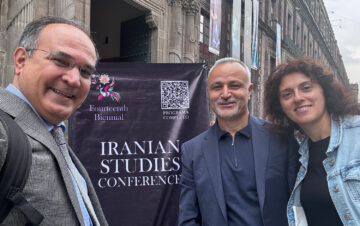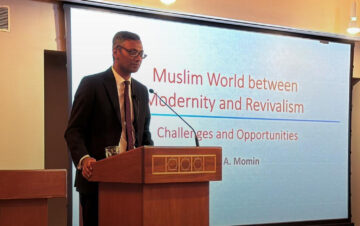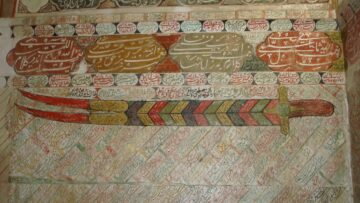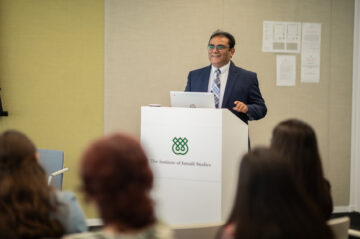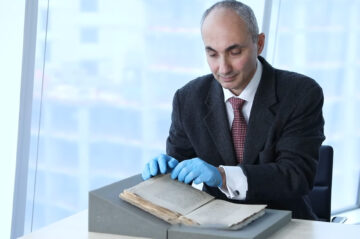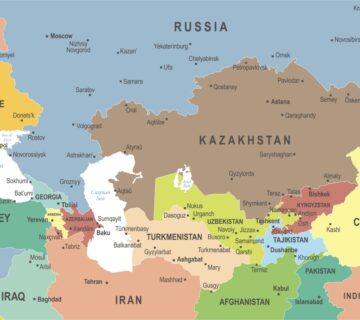Eight members of the Class of 2007 were honoured at a graduation ceremony at the Ismaili Centre in London on the afternoon of 10 September 2007. Prince Rahim Aga KhanA title granted by the Shah of Persia to the then Ismaili Imam in 1818 and inherited by each of his successors to the Imamate. was the Chief Guest and delivered the commencement address at the graduation. In attendance were over 250 guests, including Prince Hussain Aga Khan, Princess Khaliya Aga Khan, governors, faculty, staff and students of the IIS, senior leaders of the Ismaili Community in the UK as well as donors and supporters of the IIS.
The Institute attracts Ismaili students from around the globe, and this year’s graduating class included students from Canada, Iran, Tajikistan, Pakistan and India. As early as the 1980’s, the Institute had initiated programmes in collaboration with universities in Canada and the United Kingdom in which students obtained Master’s degrees in Education and Islamic Studies. Since 1994, the Institute has offered a Graduate Programme in Islamic Studies and Humanities (GPISH) in which students from various academic backgrounds come to the IIS in London for a two-year course of study and then continue on to obtain Master’s degrees in a field of relevance to the Institute’s mandate.
Dr Shafik Sachedina, IIS Governor and Head of the Department of Jamati Institutions at Aiglemont, opened the formal ceremony proceedings. He spoke of how education is a key concern of His Highness the Aga Khan and how “the IIS is playing a critical role in the development of intellectual resources as part of the network of Imamat institutions engaged in higher education.” He was followed by Dr Alnoor Dhanani, Head of the Department of Graduate Studies at the IIS, who gave the welcome address.
Dr Dhanani reflected on how 2007 was a special year, in celebration of the Golden Jubilee of His Highness the Aga Khan’s accession to the Imamat, the tenth anniversary of the graduation of the first class of GPISH students, and the beginning of the first cycle of the Secondary Teacher Education Programme (STEP) at the IIS. He commented that it is “the vision of the humanities to instill values and see them realised in individuals and societies”, and he hoped that the graduating students were ready to “engage in the enterprise of building a better world”.
In his commencement address, Prince Rahim Aga Khan spoke of how, through their studies, the graduates exemplified a commitment to seek to analyse and solve some of the problems of the developing world: “Education, international studies and diplomacy, non-profit leadership, media, development, law, and regional studies will all be among the most relevant fields of expertise in the decades ahead.” He said that he hoped the graduates will “have come to see that understanding past Muslim achievements, traditions, values, and ethics should also have equipped you exceptionally well to address the great emerging issues of our own times.”
Prince Rahim stressed the importance of understanding diversity and nurturing pluralism, “as essential to the very survival of humanity”. He asked the graduates to “include this message in your own ways in the years ahead, through your work and your words, by your attitudes, by your actions, and by example.” He encouraged the graduates to remember that “intellectual pursuits should, wherever possible, seek to address the universal aspirations of humankind, both spiritual and concrete. Those aspirations, for our generation more than for any before, are intertwined in a single global community.”
After the presentation of certificates, Class of 2007 valedictorian, Salman Alibhai from Canada, reflected on how he and his fellow graduates found their faith and understanding of Islam challenged by the thinkers, texts and ideas encountered during the programme. His valedictory address focused on how the IIS had equipped the students with “an approach to the understanding of Islam that is at once intellectual and spiritual”, whereby the development of faith and intellect is symbiotic rather than contradictory.
Concluding the formal ceremonies, Professor Azim Nanji, Director of The Institute of Ismaili Studies, referred to one of the earliest extant Ismaili Shi‘i texts, Kitab al-‘Alim wa’-l-Ghulam, which is about teaching and learning. Professor Nanji reflected that this work is a lesson to all for the need to pass knowledge on to succeeding generations.
After the graduation ceremony, Prince Rahim, Prince Hussain and Princess Khaliya met with IIS alumni of the various Institute programmes for an informal reception. Nearly 100 alumni, from across the world, were in London over the weekend for their second triennial reunion.
For more information about GPISH and other graduate programmes, see the IIS website.

